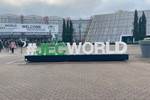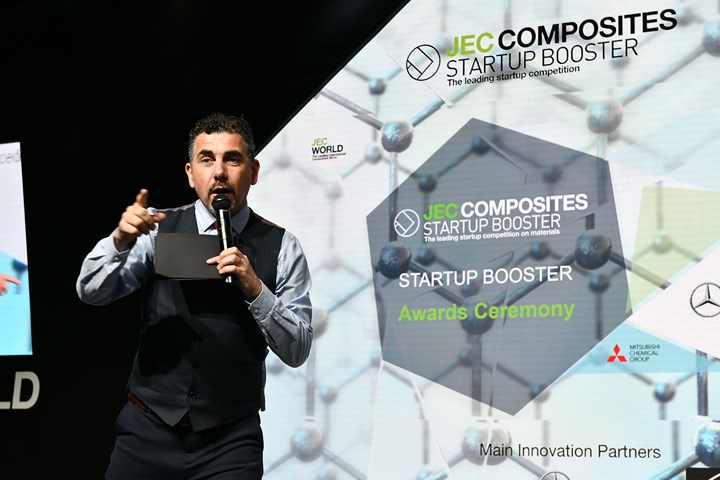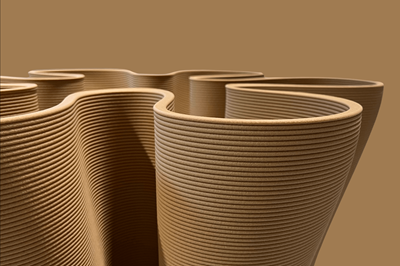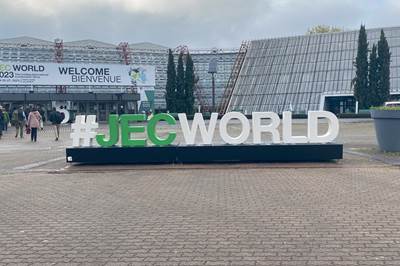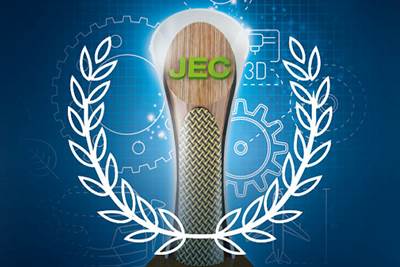Top 20 JEC Startup Booster 2024 finalists are revealed
Tailored to find and assess the best startups in the composite industry, the 20 Booster competition finalists will be pitching their projects on stage March 5-7 at JEC World 2024.
Out of 100 entrepreneurs, SMEs, startups and university spin-offs, JEC Composites (Paris, France) has announced 20 finalists selected for the 2024 JEC Startup Booster, a competition that has established itself as a global reference for entrepreneurship in the composites industry. Sponsored by Airbus and Owens Corning as the main innovation partners, and the Mercedes-Benz Group as the innovation partner, finalists will have the opportunity to present their projects before an expert jury on the JEC World stage from March 5-7, 2024 at the Paris Nord Villepinte.
Initiated in 2017, JEC Startup Booster provides a networking opportunity, offering increased visibility into the future of the composites industry. Held in three regions (Europe, the U.S. and Asia), the competition has already fostered the emergence of more than 900 innovative projects from more than 60 countries. It has become an essential springboard for participants seeking international opportunities.
“Supporting this competition gives us the ability to identify innovations early in the key area of composites that we would not otherwise discover,” Jelle Bloemhof, head of composites manufacturing technologies at Airbus, says. “JEC Startup Booster is just the first step toward broader collaboration opportunities. It facilitates an introduction between participants and industry end-users, providing the opportunity to engage directly and discuss. The diversity of ideas is inspiring, and we look forward to continuing our partnership.”
According to Chris Skinner, vice president of strategic marketing and R&D at Owens Corning, this year’s list of finalists covers a wide range of technologies. “They not only reflect industry trends but also play a major role in shaping them. This is significant for us as partners and for JEC World, as it is a rich source of inspiration and opportunities,” he notes.
Following the application process, two pitch sessions — each featuring 10 presentations — will take place on the Agora stage (Hall 6):
- Tuesday, March 5, at 10:00 a.m. for the “Products & Materials” category
- Tuesday, March 5, at 4:30 p.m. for the “Processes, Manufacturing and Equipment” category
Three winners will be designated by the jury, along with one winner for the sustainable dimension of the project. The award ceremony will take place on Wednesday, March 6, at 3:30 p.m. in Agora 6.
The jury includes:
- Jelle Bloemhof, head of composites manufacturing technologies at Airbus
- Karl-Heinz Fueller, manager future exterior and Materials, Mercedes-Benz
- Rebecca Ravenni, program manager and investment analyst, Techstars Sustainability Paris
- Florent Illat, head of Safran Corporate Ventures, Safran
- Chris Skinner, vice president of strategic marketing and R&D at Owens Corning
Category: Products & Materials
- BioHalo (Denmark): The company’s mission is to introduce bio-based materials that serve as safe, eco-friendly and high-performance replacements for harmful per- and polyfluoroalkyl substances (PFAS).
- BioTwin (U.K.): BioTwin’s vision is to revolutionize construction and build zero-carbon villages and cities for a sustainable world via new materials. It presents its first innovation, a low-carbon wall stud made of hemp and resin, which will help the construction sector meet embodied carbon demands.
- Carbocon (Germany): Carbocon an independent service provider in the field of carbon-reinforced concrete. It operates in different areas of business, ranging from civil engineering services to introducing new products and processes to the market. In this way, Carbocon advocates progress and sustainability in the building industry.
- Cellexcel (U.K.): As a chemistry-based technology company, Cellexcel says it provides the key to unlock the use of biomaterials and radically change industry’s carbon footprint. It does this through molecular modification and not a coating. The Cellexcel process chemically modifies the cellulose by delivering and then attaching a compound related to the targeted performance property. By attaching a hydrophobic compound, the resistance to moisture can be positively impacted, enabling biomaterials to be used in more demanding applications, that can then lead to the replacement of high embedded emission materials.
- High Temperature Material Systems (U.K.): The company’s core mission is to develop bespoke ceramic matrix composite (CMC) materials and to push the boundaries of innovation. Through its R&D capabilities, High Temperature strives to pioneer novel matrix chemistries that yield improved performance, durability and functionality.
- Nano Electronics (South Korea): By using ultrafine nano threads through electrospinning, Nano Electronics has created copper nanofiber films with high electrical conductivity, resulting in efficient conductive heating elements with exceptional heat transfer capabilities. As a result, the company has achieved a nano-surface heating element with up to 89% power efficiency compared to traditional heating wires, providing three times greater heat generation efficiency and instantaneous heating.
- ReCarbon (Italy): ReCarbon gives new value to carbon fiber waste, creating, producing and offering innovative, ready-to-use intermediate products based on recycled carbon fiber. ReCarbon has developed a functional approach for manufacturing products in the form of both thermoplastic organosheets, thermoset prepregs and sandwich panels, with different combination of skins and cores.
- Sargassum Eco Lumber (U.S.): The proliferation of sargassum (algae), has become a global concern, notably affecting countries in the Caribbean, the Gulf of Mexico and the Atlantic coasts of Africa and South America. In response, the Sargassum Eco Lumber project proposes a novel approach that leverages this environmental challenge by repurposing sargassum and polyethylene waste into a commercially viable, sustainable building material.
- SpacEngineer (Portugal): In 2018, the problem of small space debris was presented to the SpacEngineer team. Due to the previous experience of the team in the ballistic, in 2019, SpacEngineer was created. The goal of SpacEngineer is to develop composites, that retain a high amount of green materials, are flexible and have the capability to dissipate a high amount of impact energy. With this objective, Impact2Space was born. Currently, the technology is under validation for aeronautic and aerospace applications.
- Zila BioWorks (U.S.): Zila has developed a patented bio-epoxy resin for use in industrial composites, coatings and adhesives. The company has identified clear steps to a 60% reduction in carbon footprint compared to petroleum-based epoxies. Moreover, it says its vitrimer technology can help manufacturers deal with the end of life of their products.
Category: Process, Manufacturing & Equipment
- CarboScreen (Germany): CarboScreen offers cutting-edge sensor technology in combination with AI-based online monitoring to significantly reduce production cost while increasing product quality of carbon fibers and reliability of oven equipment.
- Componous (Greece): Componous specializes in embedding optical fiber sensors in composite structures. These sensors can monitor multiple analytes with proven field capabilities. Componous revolutionizes the market with cost-effective, in-house-developed sensor readout units with state-of-the-art specifications.
- Eddytec (Netherlands): Eddytec is a spin-out from the University of Amsterdam and the Amsterdam University of Applied Sciences. Its ambition is to transform defect detection in carbon fiber composites making it fast, simple and affordable. The technology is based on eddy currents and allows for easy detection of cracks and imperfections in a variety of applications including manufacture and maintenance of aircraft, wind turbines and cars. Eddytec’s sensor and software solution reduces measurement time and complexity of data collection and enables technical personnel with various levels of experience to interpret the results increasing usability.
- Elementag (Italy): Elementag is the latest technology developed by Particular Materials. It represents an innovation for supply chain traceability and anticounterfeiting. By using nanoparticles as inorganic fingerprints that can be applied to virtually any product or material, the company says it can guarantee its authenticity in a quick and reliable way by scanning it with a portable device. Elementag overcomes the main limitations of traditional technologies (QR/barcodes, NFC, RFID), and is invisible, processing-resistant, hard to replicate and fully embedded.
- Fiberior (Germany): Through fiberior’s innovative manufacturing process, it is able to produce a cost-effective pipeline system for the transport and storage of hydrogen. Compared to conventional steel pipelines, its system is made of fiber-reinforced thermoplastics. In addition to numerous advantages, they can also be used for hydrogen storage in the pipeline grid. This feature is a key aspect in enabling the transformation of the energy industry toward renewable energy sources.
- Holy Technologies (Germany): Holy Technologies is on a mission to lightweight the future of mobility, by designing sustainable production systems that are highly scalable. Holy is the developer of a machine learning-enhanced additive manufacturing system for composite components. The company helps innovation leaders across industries to make their structural carbon fiber components up to 30% lighter, 50% cheaper and 100% recyclable. The technology addresses 80% of component types, ranging from automotive, medical and sports equipment, to aerospace and wind turbine blades.
- Mob-E-Scrap (France): Mob-E-Scrap is a French startup founded in 2021 to deploy its patented delamination technology on various markets: electronic scrap, composites, solar panels, batteries, etc. By submitting composites to high intensity and high frequency impacts, Mob-E-Scrap can separate the fibers (glass and carbon) which keep a length up to 50 millimeters and resin, which is pulverized. The company has built a demonstrator at industrial scale in France, and is now looking for partners to deploy the technology for the composites recycling market.
- Reinforce3D (Spain): Reinforce3D is a startup aimed to further develop and commercialize its continuous fibre injection process (CFIP) technology. CFIP is a novel composite processing method which unlocks new capabilities, such as the ability to place continuous fibers in all directions following complex trajectories, to reinforce any material including plastics, metals and ceramics or to integrally join different parts. “Delta” is the first commercial CFIP machine, enabling the efficient manufacturing of highly optimized 3D composite structures at industrial scale.
- TechnoCarbon Technologies (France): TechnoCarbon designs, develops, manufactures and sells components and systems made of the sustainable, ultra-low-carbon composite materials to outperform steel and reinforced concrete. Its patented technologies enable deep decarbonization, lifetime extension, weight and environmental footprint reduction.
- 3P.Com (South Korea): 3P.Com designs, develops recyclable and affordable hydrogen tanks according to customers’ requirement and specification using a new optimization design methodology and in-house design tools, transfers the technology license and provide prototype hydrogen tanks, meeting performing industrial standard safety requirement.
Read Next
Sulapac introduces Sulapac Flow 1.7 to replace PLA, ABS and PP in FDM, FGF
Available as filament and granules for extrusion, new wood composite matches properties yet is compostable, eliminates microplastics and reduces carbon footprint.
Read MoreJEC World 2024 preview
The world’s largest composites industry trade event returns to Paris, France, March 5-7, 2024, featuring exhibits, awards, conference programming and more.
Read MoreInnovation Award finalists revealed for JEC World 2024
Returning to the international composites trade show are the Innovation Awards, representing up to 33 finalists in 11 categories that highlight composites innovation excellence and fruitful collaborations.
Read More


